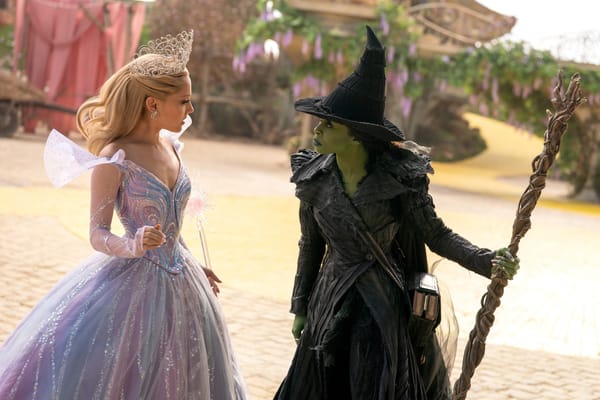TIFF 2024: ‘Saturday Night’ Is as Fun and Uneven as an SNL Episode
Stephen David Miller closes out his Toronto Film Festival coverage with a handful of highlights, and a review of Jason Reitman’s ‘Saturday Night.’
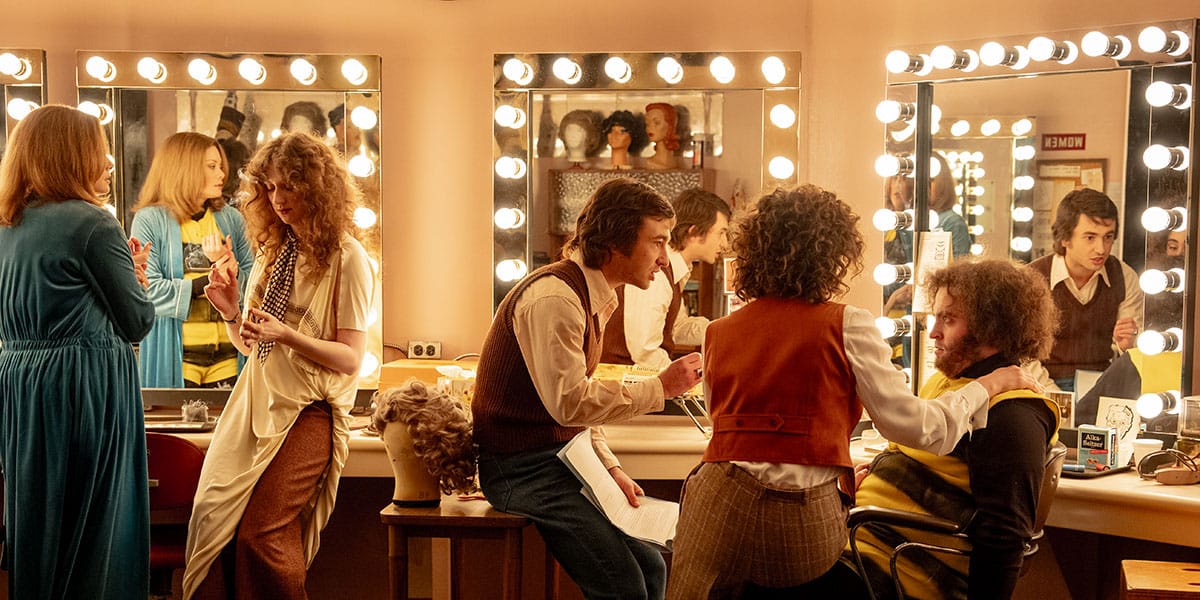
Hello, Decoding Everything readers! I’m here again to close out my coverage of the 2024 Toronto International Film Festival. By the time you’re reading this I’m likely already back at my day job, struggling to explain to coworkers why I’m returning from “vacation” more exhausted than when I left. If there’s a way to watch 25 movies in a week and not fry your brain at least a little, I’ve yet to discover it. It’s a marathon every single time, and crossing the finish line always comes with some relief.
Sunday marked the official close of the festival, and with it the announcement of the winners of the People’s Choice Awards. For the most part, they went about as I’d expected, with Cannes favorites nabbing 3 out of 4 of the audience prizes for narrative films. Emilia Pérez and Anora scored silver and bronze respectively in the main competition, and The Substance took home the gold for the Midnight Madness bracket. (I’ll say more about The Substance in a minute). Still, TIFF has a long tradition of selecting a new-to-the-fall film for the top prize, and this year that honor was bestowed on The Life of Chuck. As I mentioned in the last update, Mike Flanagan’s Stephen King adaptation is lovely, life-affirming fare, and it doesn’t surprise me that voters were enchanted. For my money it just relied too heavily on Nick Offerman’s narration, holding our hands through emotions that had already been communicated beautifully on screen. I tend to be allergic to spoon-fed sentiment, even when it’s delivered by Ron Swanson’s dulcet baritone. Clearly, though, I’m in the minority!
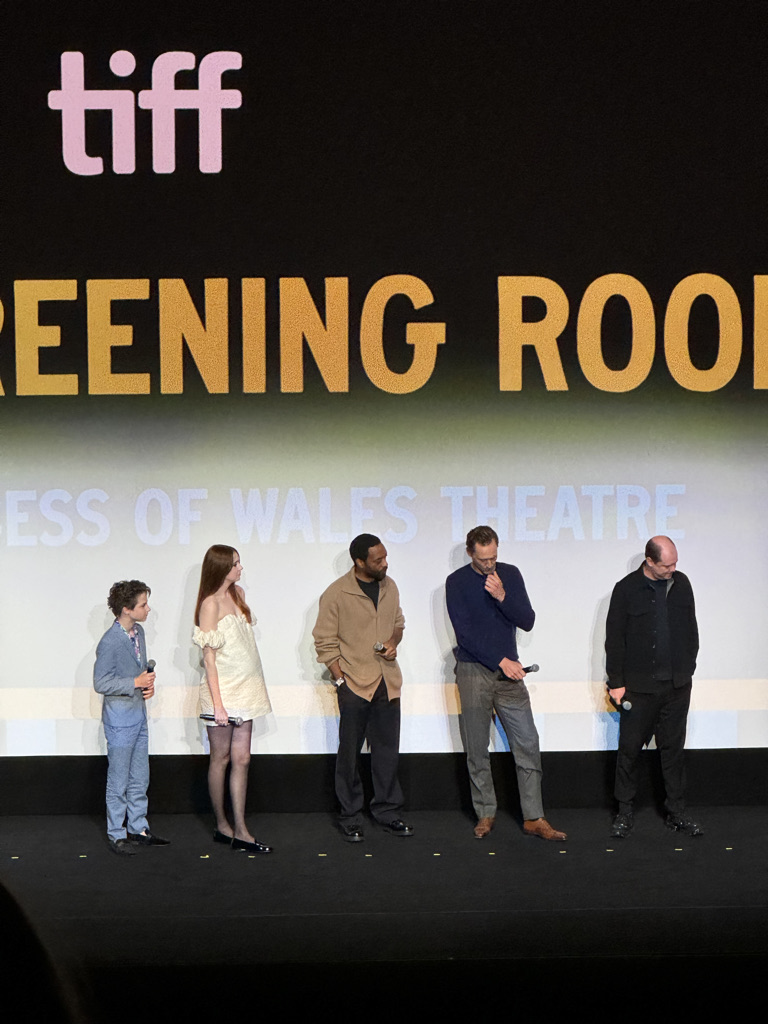
Today, I’ll give you a quick overview of the remainder of the festival, then conclude with a review of what many assumed would win the People’s Choice Award: Jason Reitman’s Saturday Night.
Festival Wrap-Up
My second half of the festival played out much like the first, in that most everything I caught hovered in the range of good-but-not-quite-great. This included many of the bigger, star-driven vehicles of the fest:
- Marielle Heller’s Nightbitch is a very funny, and occasionally powerful, story about a new mom (Amy Adams) who is so overworked she believes she might be turning into a dog. Its twists are about as surprising as its central metaphor is subtle, but Adams’ commitment to the material more than sells it.
- Halina Reijn’s erotic drama Babygirl is a similarly honest exploration of womanhood elevated by a committed lead performance (Nicole Kidman), though I’m still chewing over what, if anything, it actually wants to say.
- Nacho Vigalondo’s Daniela Forever, by contrast, has no shortage of things it’s trying to communicate. Melding the spirit of Eternal Sunshine of the Spotless Mind with the experimental visual style of I Saw The TV Glow, the high-concept romance is so stuffed with ideas it has a tendency to trip over itself. Still, I admire the audacity.
- Malcolm Washington’s The Piano Lesson is a finely crafted retelling of an August Wilson play about grief and generational trauma. It bears all the hallmarks of a stage-to-screen adaptation, often feeling less like a narrative film than a dialogue delivery system. But with a cast this brilliant and language as sharply-written as Wilson’s, it’s hard to find much reason to complain.
There are three films, though, which rose above the pack:
- Chris Sanders’ The Wild Robot was arguably the safest bet of the fest. An animated film from the creative team behind How To Train Your Dragon and Lilo and Stitch, featuring performances from Lupita Nyong’o, Pedro Pascal, Ving Rhames, Mark Hamill, Bill Nighy, and Stephanie Hsu—what more could an emotionally exhausted festival-goer want? I’m happy to report that the latest from Dreamworks Animation not only met my expectations, it exceeded them. Based on Peter Brown’s series of illustrated children’s books, it follows a service robot (Nyong’o) who finds herself on an island inhabited solely by forest creatures. Searching for a purpose, she winds up becoming a surrogate mother to an orphaned baby goose (Kit Connor). The animation is gorgeous, balancing a hand-drawn aesthetic with clean, futuristic 3D depending on the character or situation. The comedy is fresh and surprisingly dark, devoid of the lazy comic crutches and pop culture references that tend to plague the genre. And it’s legitimately moving, in a manner that sneaks up on you. What starts as a predictably charming fish-out-of-water story eventually becomes a tear-jerking reflection on the sacrifices of parenthood: The Giving Tree with laser guns and wise-cracking animals. Like Up or WALL-E, the core premise is far more memorable than the zany third act that follows. As with those Pixar classics, though, it’s too delightful to hold that fact against it.
- Under the Volcano is one of those hidden, festival gems that came out of nowhere and blew me away. Damian Kocur’s drama follows a Ukrainian family who are forced to extend their vacation on the Canary Islands after the Russian invasion grounds their flight home. The synopsis might sound like it’s teeing up a harrowing refugee saga, but Kocur is far less interested in depicting tragedy than he is in exploring the cognitive dissonance it provokes in those who grapple with it. Similar to Aftersun, this is a quiet meditation on the things that go unsaid, the magma bubbling just beneath the surface. Rather than confront the unimaginable, each family member spends the rest of their vacation trying to deflect or redirect it. They plaster on smiles, hunt for scenic Instagram moments, and start heated arguments about minor things they can control. This is a bold way to deal with history so recent and intense, and it probably won’t be for everyone. But personally, I can’t stop wrestling with it.
- I allowed myself a single rewatch at this year’s festival, and that was Coralie Fargeat’s The Substance. After rocking unsuspecting cinephiles at Cannes, I had to know how the Demi Moore-helmed body horror would hold up for viewers with more context. Primed by months of buzz and trailers, everyone entered my theater knowing they were in for a wild ride. Luckily, no level of hype can prepare you for this particular rollercoaster. Fargeat had my audience eating out of the palm of her hand, me very much included, and seeing her Cronenbergian nightmare again only cemented just how impressive a feat she’s pulled off. In a week where I’ve seen multiple films about the pressures placed on women by society (The Last Showgirl, Babygirl, Nightbitch), The Substance remains unparalleled in its potency—and Moore in her total commitment as lead. Do yourself a favor, and race to the nearest movie theater to catch it this weekend.
The Movie: Jason Reitman’s Saturday Night
There’s an idea Vulture’s Jesse David Fox floated a few years ago that has always stuck with me. He argued that Saturday Night Live (stylized as SNL moving forward to avoid confusion) was best understood not as a piece of entertainment, but as a televised sport. It’s a decades-spanning institution which is continually reinventing itself. It has a roster that changes annually, composed of versatile all-stars, second string players, and special teams members who are key for a few specific moments but spend most of their time on the bench. It has “good seasons” and “bad seasons,” though which is which will be hotly contested based on your age and penchant for rose-tinted glasses. Almost every television show has its share of diehard defenders, who would binge from start to finish and proclaim the entire product “great.” But if there’s a person alive who thinks every episode of SNL is funny, I’ve yet to meet them. Even the best season is bound to have an off night, and even an all-timer episode will have a sketch that doesn’t land. Far from being a barrier to enjoyment, that unevenness is a crucial aspect of the viewing experience. You learn to suss out the strengths and weaknesses of individual performers and how they complement one another as a team. When a bit falls flat, you armchair quarterback the reasons why. And when a player you’ve been watching rise for years suddenly has a star-making moment, it’s exciting precisely because you know how badly it could have gone or has gone before. The point isn’t to witness an endless string of perfect shots. It’s to see what this particular team can pull off, given a considerable risk of failure.
Jason Reitman’s Saturday Night is all about that high-wire act. We open on the night of the team’s first game: October 11, 1975, 10:00pm. What follows is a heightened reimagining of that hectic first production, unfolding nearly in real time. It’s 90 minutes before showtime, and the head coach Lorne Michaels (Gabriel LaBelle) is a bundle of nerves. Script rewrites are coming down to the wire, and the network censor (Catherine Curtin) is sure to call for more. Guest stars like Billy Crystal (Nicholas Podany) are demanding more time than the show has room to give, and at least one key player, John Belushi (Matt Wood), has yet to sign a contract. Lights catch on fire. A sound system is blown. Host George Carlin (Matthew Rhys) is stoned out of his mind. Meanwhile, the top brass at NBC (Willem Dafoe) is monitoring all of this like a vulture, while producer Dick Ebersol (Cooper Hoffman) scrambles to placate him. Nothing is going according to plan, and yet the countdown slows for no one. As the real Michaels is quoted as saying, “The show doesn’t go on because it’s ready; it goes on because it’s 11:30.”
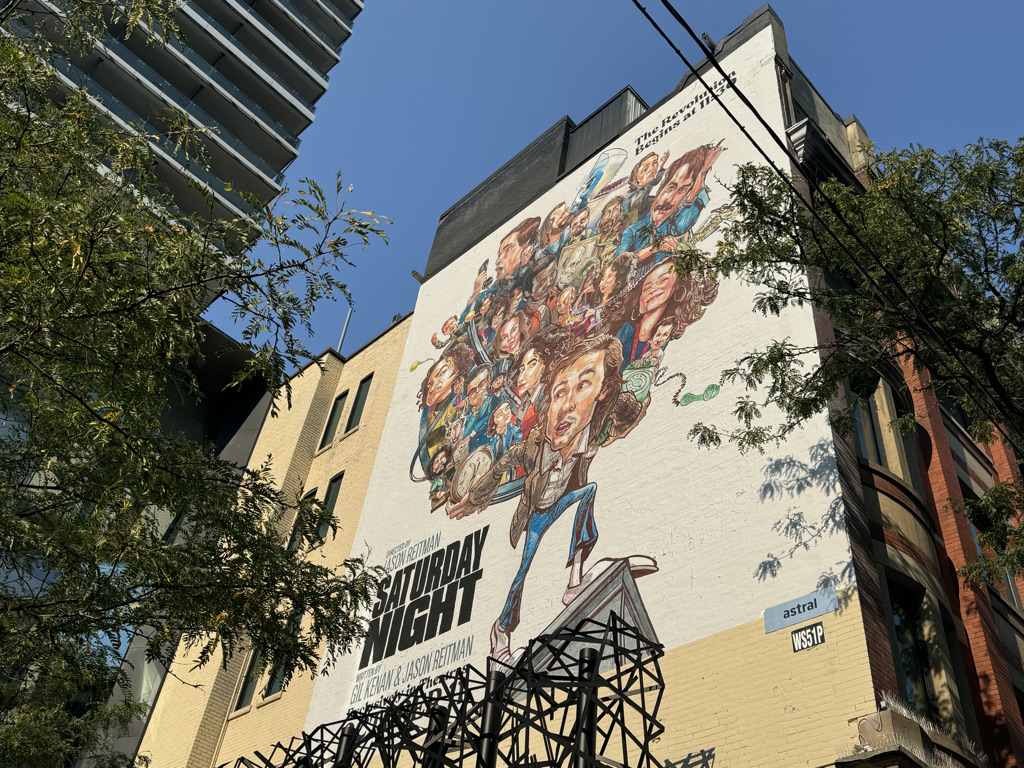
True to the institution it’s honoring, Saturday Night functions less as a cohesive work than it does a manic assortment of sketches. The camera glides through 30 Rock like it’s the Copacabana, tugging us from room to room as Michaels and his wife Rosie Shuster (Rachel Sennott) attempt to wrangle the production. In each room, there’s a new group with a new issue to tackle. Some of them are hilarious, others seem to fizzle, and nearly all zip by in two, maybe three minutes flat. Technically speaking there are narrative stakes, but they’re building to the same foregone conclusion: We know exactly what will happen when the 90 minutes are up. Like watching a rebroadcast of a match when you’ve already had the score spoiled, the joy of Reitman’s movie is all about the dynamics of the game. Who was cast to play which comic icon, and will they nail the impression? What famous sketches will they pull out of the playbook and recreate? Who will land the perfect zinger just before the buzzer sounds?
Overall, those dynamics add up to a breezy, funny ride. But as with the political cold opens SNL churns out every election season, the humor has more to do with basic mimicry than content, more Alec Baldwin and Larry David than James Austin Johnson or James Adomian — reenacting things that actually happened with the goofiness cranked to 11, but little discernible point of view. We’ve got Belushi ice skating in a bee costume, Andy Kaufman (Nicholas Braun) lip-syncing to Mighty Mouse, Chevy Chase (Cory Michael Smith) killing it on Weekend Update while being a piece of shit backstage, and at least one sketch lifted verbatim from the pilot. All things which are cemented in cultural memory and faithfully performed by a talented cast. These carbon copies are almost as entertaining as the originals they reference, and Reitman’s looseness with the timeline lets him compress them into a metaphorical Best Of DVD.
There are plenty of laughs. It’s brimming with energy. I was never remotely bored. But it’s hard to shake the feeling that it’s all a bit hollow. There is none of the critique of the comedy boys’ club that you would find in, say, a Hacks; no Jobs-esque deconstruction of the man behind the Lorne mythology. It simply is, spinning plates and tap-dancing without having much of anything to say.
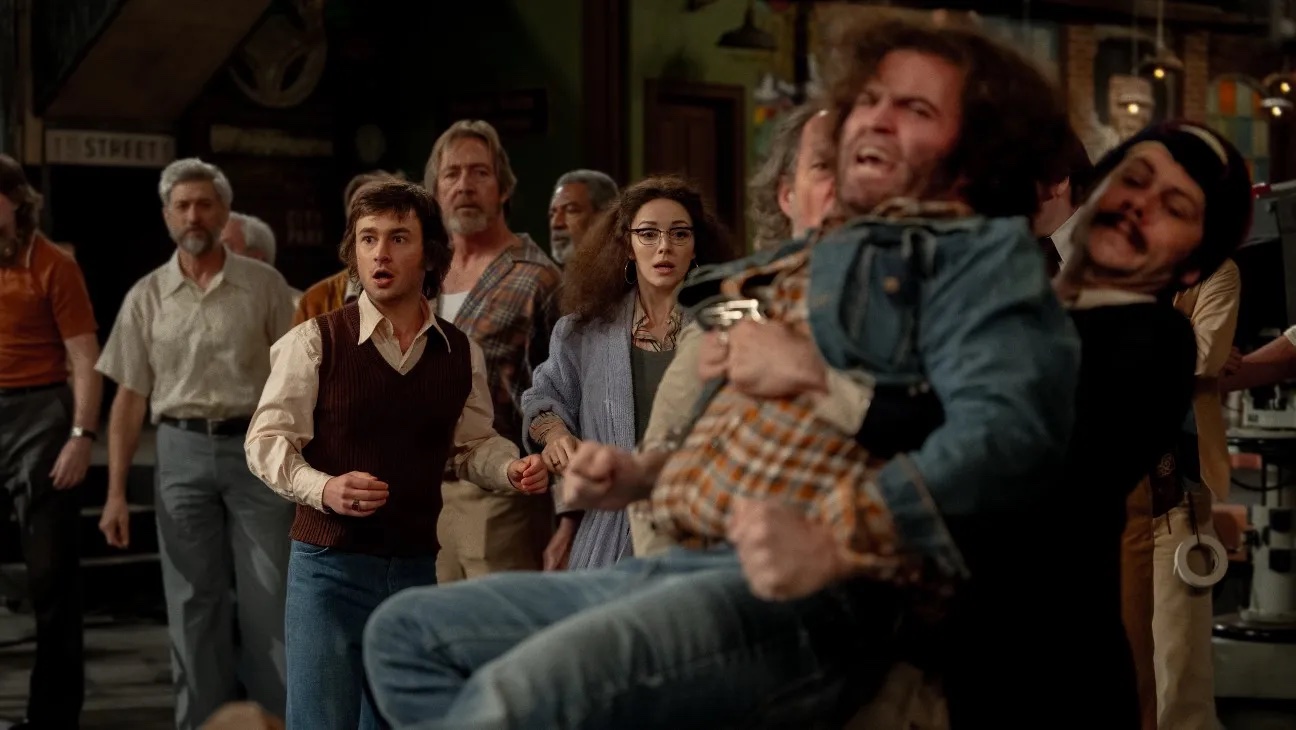
One of the high points of Saturday Night is a monologue delivered by Gilda Radner (Ella Hunt), which opens with a question: “Do you ever have nostalgia for a moment while you’re still in it?” Another one comes from Michaels, when he’s backed into a corner and forced to explain what exactly it is he’s trying to build. He likens the show to the feeling of an all-nighter in New York City, the sense that you might stumble any moment into something wonderful and wild. And it’s these two ideas that sum up my conflicted feelings about the film. Reitman wants to communicate the unpredictability and irreverence that first made SNL a sensation, but the overriding mood he builds is one of pure nostalgia. While nostalgia can be a lovely thing to bask in, worship of the glory days is the polar opposite of cool. It’s a sleepover in suburban New Jersey with a warm cup of tea. It’s Milton Berle (J.K. Simmons) flashing a smile to an audience whose tastes are frozen in the Golden Age, shimmying on stage to a tune they’ve heard a thousand times before. After nearly half a century of cultural change, is this really the best that we can muster? I have to think the objects of Reitman’s nostalgia—or at least the anarchic band of outsiders he uncritically portrays them as—would disagree.
As much as I fault Saturday Night for a failure of ambition, there’s no denying its charms. I suspect it will be a hit when it goes wide this October, and on balance I’m still inclined to recommend it. Just be sure to set your expectations accordingly before heading to the theater. It’s an empty-calorie snack that goes down smooth: pleasant, nicely crafted, and forgettable.
Stephen David Miller is a film critic in California and the co-host of the podcast, The Spoiler Warning, where you can listen to him recap his TIFF experience.
Stuff David Chen Has Made
David Chen here. Below are a few things I’ve been working on this past week:
- [PAID ONLY] On my Patreon page, I discussed what it was like to go on a Disneyland VIP tour with a bunch of my friends and colleagues. Is the intense experience worth it? Listen here.
- On Decoding TV, we discussed the glory of Slow Horses, which remains one of the most consistently entertaining shows on TV. We also chatted about the docuseries Chimp Crazy, which came to a memorable conclusion last week.
- On The Filmcast, we were super fortunate to be joined by actor/filmmaker Alex Winter to discuss Jeremy Saulnier’s Rebel Ridge. Check it out.



